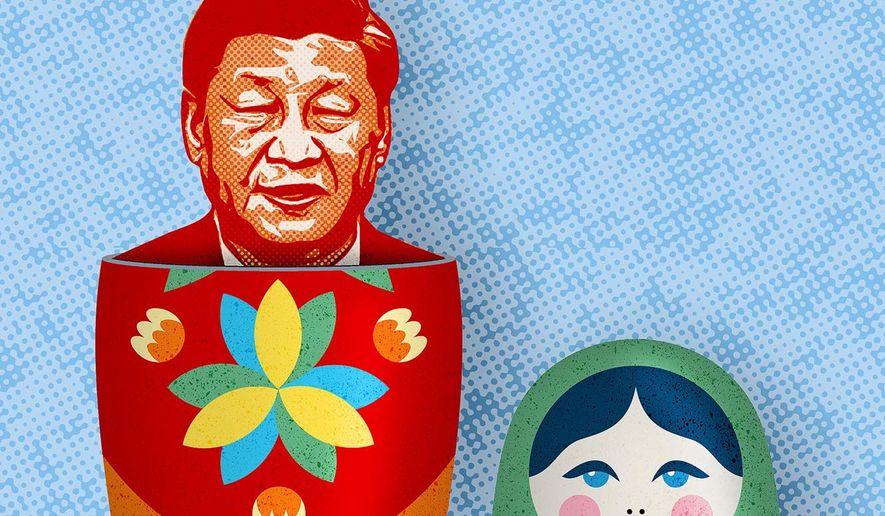OPINION:
In Beijing on Feb. 4, Russian President Vladimir Putin stood beside Chinese President Xi Jinping to celebrate the opening day of the Chinese Winter Olympics and to announce a new strategic partnership between the two regimes.
In a joint statement, the two leaders said, “Friendship between the two States has no limits, there are no ‘forbidden’ areas of cooperation,” promising to work against the United States and supporting each other on Ukraine and Taiwan. Mr. Putin must have shared his plans for the invasion of Ukraine with Mr. Xi.
About 10 days after the Xi-Putin meeting, President Biden, seeking Chinese help to dissuade Russia from invading Ukraine, foolishly shared with Mr. Xi U.S. intelligence on Russian forces near Ukraine. The Chinese, of course, immediately shared that information with the Russians. Twenty days after the Beijing summit meeting, Russia invaded Ukraine.
CIA Director William Burns, in a speech on April 14, said “A silent partner in Putin’s aggression, Mr. Xi’s China is our greatest challenge, in many ways the most profound test the CIA has ever faced.” He called the People’s Republic of China a “formidable competitor lacking in neither ambition nor capability.”
Despite the declaration by Mr. Putin and Mr. Xi, there are political and practical limits to their strategic partnership, even “forbidden areas” for their cooperation. Mr. Putin and Mr. Xi are apparently exploring what those limitations and forbidden areas are regarding the former’s invasion of Ukraine.
Mr. Biden, in a telephone call with Mr. Xi last month, warned him of severe consequences if China gave material support to the Russian invasion of Ukraine.
For a time, the visible signs of China’s support for Russia’s invasion of Ukraine were nothing more than Chinese regurgitation of Russian propaganda. But now, according to one report, U.S. intelligence officials believe that Russia has asked China for more substantial help. It may already be coming.
As The Washington Times’ Bill Gertz reported, China sent six of its huge Y-20 cargo aircraft to Serbia earlier this month. Serbia, an ally of Russia, took delivery of some kind of military equipment, possibly surface-to-air missiles. The question is whether Serbia sent the equipment to Russian forces in Ukraine or had already sent other equipment and received the Chinese shipments in payment.
The Chinese shipments and possible Serbian transshipments demonstrate two closely related points of limitation.
First, China is supporting Russia’s Ukraine invasion but only to the extent that it can be done with plausible deniability. It has denied sending equipment to Russian forces in Ukraine, insisting that the shipments — whatever they are — were entirely for Serbia.
Second, Mr. Xi sees that Mr. Putin has ruined his, and his armed forces’, reputations in Ukraine and doesn’t want to share that loss of prestige. While Mr. Putin’s international stature is still strong, it is due more to Russia’s near-stranglehold on European energy supplies and the fact that its nuclear arsenal is — as Mr. Putin has implied — a constant threat.
In contrast, Mr. Xi’s China — in many ways no less aggressive than Mr. Putin’s Russia — hasn’t yet resorted to force to capture Taiwan. China has a constantly-growing nuclear arsenal and a greater role in global trade. Mr. Xi is waiting and watching Mr. Putin’s Ukraine invasion to see how far he can push the West, or Mr. Biden, into appeasement.
Mr. Xi’s aggression takes many forms. The constant Chinese cyberwar, and the espionage it entails, is one of its major elements. China’s aggressions around the South China Sea, where it is building missile and aircraft bases on islands it sometimes creates. China claims island territories near Japan and the Philippines as its own. Mr. Xi’s aggression has also penetrated U.S. borders, demonstrated by the Justice Department’s arrest of three men, apparently working for China’s Ministry of State Security, for spying on and harassing Chinese nationals in the United States.
Like Mr. Putin, Mr. Xi has great ambitions in the Arctic and believes the expansion of NATO is an act of aggression by the United States.
And then there is the constant threat to Taiwan. Mr. Xi has, so far, not taken the step in Taiwan that Mr. Putin took in Ukraine. That may come after the next Chinese Communist Party congress.
It is unclear whether Mr. Putin’s lack of success in Ukraine so far has reduced his ability to stay in power. His position can be strengthened but only by a definite victory in Ukraine. In contrast, Mr. Xi’s power is being solidified.
Chinese people are taught, perhaps compelled, to study “Xi Jinping thought.” The last Chinese leader to achieve that level of power was Mao Zedong. Last November, in a “history resolution,” the party confirmed that Mr. Xi had the firm backing of the CCP. Later this year, the Chinese Communist Party will hold another party congress. At this year’s congress, Mr. Xi will be elected to an unusual third term as president. That could effectively make Mr. Xi, at 68, the Chinese leader for his lifetime.
Despite their strategic agreement, America needs separate policies to deter and, if necessary, confront Mr. Putin and Mr. Xi. Meanwhile, at the White House Easter egg roll, Mr. Biden had to be pushed away from answering a reporter’s questions about Afghanistan by an aide dressed up as the Easter Bunny.
• Jed Babbin, a deputy undersecretary of Defense in the George H.W. Bush administration, is the author of “In the Words of Our Enemies” and a Washington Times columnist.




Please read our comment policy before commenting.